Cite this document
(“How Was Alexander The Great as a Leader Research Paper”, n.d.)
Retrieved from https://studentshare.org/history/1439874-how-was-alexander-the-great-as-a-leader
Retrieved from https://studentshare.org/history/1439874-how-was-alexander-the-great-as-a-leader
(How Was Alexander The Great As a Leader Research Paper)
https://studentshare.org/history/1439874-how-was-alexander-the-great-as-a-leader.
https://studentshare.org/history/1439874-how-was-alexander-the-great-as-a-leader.
“How Was Alexander The Great As a Leader Research Paper”, n.d. https://studentshare.org/history/1439874-how-was-alexander-the-great-as-a-leader.


